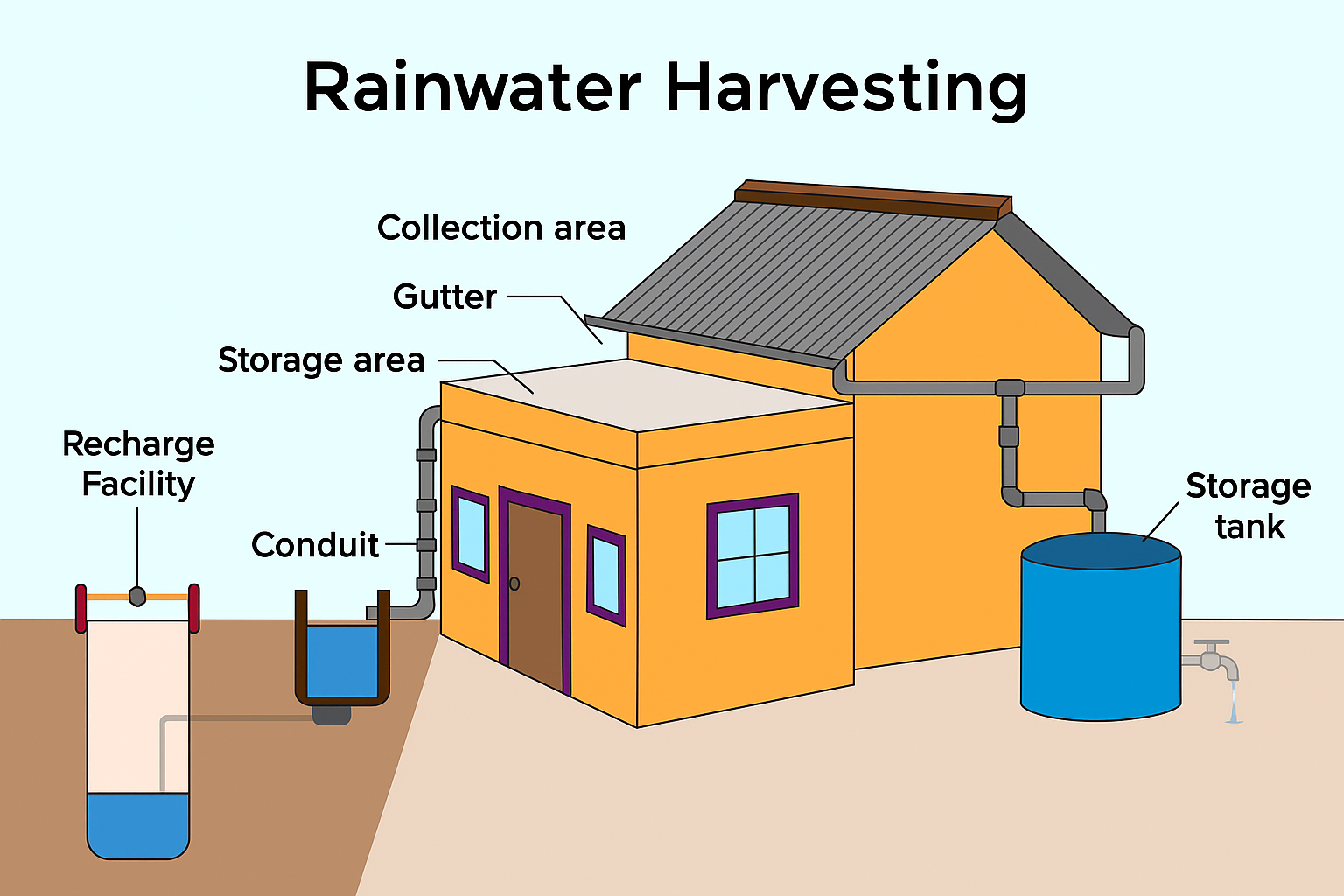India is currently witnessing one of the heaviest monsoon seasons in recent years. While overflowing dams and waterlogged cities dominate the headlines, another reality lurks beneath the surface—water scarcity. Despite abundant rainfall, much of this precious resource runs off into drains, leaving groundwater tables depleting and cities staring at a future where water could become more valuable than gold.
For homebuyers, investors, and developers alike, the integration of rainwater harvesting (RWH) in any property isn’t just an environmental choice anymore—it’s a necessity. As a responsible real estate brand, 99 Realty believes that understanding the importance of RWH can help you make informed property decisions and secure long-term sustainability.
Let us dive into the history, working, benefits, and future relevance of rainwater harvesting, and why it should be a key factor before you buy your next property.
The Ancient Wisdom of Water Conservation
India has a rich heritage of water management that dates back thousands of years. Our ancestors understood the value of monsoons and designed ingenious systems to collect and store water:
- In Rajasthan, structures like Johads (earthen check dams), Baoris (stepwells), and Taankas (covered underground cisterns) became lifelines in arid zones.
- In Bihar and Jharkhand, the Ahar-Pyne network of channels and retention ponds effectively conserved monsoon water for agriculture.
- South India perfected its Eri system—large interconnected tanks designed to capture and distribute rainwater.
These traditional systems showcase how community-driven water management sustained millions of people in regions with unpredictable rainfall.
Fast-forward to today, we have modern technologies and infrastructure—but somewhere along the way, we lost this connectivity with nature. The result? A looming water crisis despite receiving over 1,000 mm of annual rainfall across most parts of India.
Noida 2025: Upcoming Infrastructure Projects and Their Impact, Overview of planned developments and their potential effect on property values.
India’s Water Paradox: Heavy Monsoons, Deepening Scarcity
This year’s monsoon season has brought record-breaking rainfall, filling reservoirs in several states to near capacity. For instance, Maharashtra’s dams are almost 90% full, far higher than last year’s levels. Yet, paradoxically, many urban areas are still experiencing water cuts and shortages.
Why? Because most rainwater isn’t harvested or stored. Instead, it flows into rivers, drains, and oceans. Meanwhile, our dependency on groundwater continues to rise. Studies suggest that India extracts more groundwater than any other country in the world, with nearly 80% used for agriculture and an ever-growing demand from cities.
If current trends continue, experts predict that 21 Indian cities, including Delhi, Bengaluru, and Hyderabad, may run out of groundwater by 2030. This alarming possibility makes rainwater harvesting not just important—but urgent.
Why Homebuyers Must Check for Rainwater Harvesting
Before investing in a property, especially in growing urban hubs, checking whether the building has a properly designed RWH system can save you money, resources, and future headaches. Here’s why:
1. Resilience During Water Shortages
Properties with RWH systems are less dependent on municipal water supply. During droughts or summer shortages, harvested rainwater can act as a reliable backup for daily needs like cleaning, gardening, and even drinking (if treated properly).
2. Prevents Flooding and Waterlogging
With extreme monsoons becoming more frequent, well-planned RWH systems channel excess rainwater away from foundations and basements, preventing flooding, seepage, and structural damage.
3. Boosts Groundwater Levels
RWH directly replenishes underground aquifers. In areas facing falling water tables, this is critical for sustaining borewells and ensuring long-term availability of fresh water.
4. Compliance and Future Regulations
Several states like Uttar Pradesh, Haryana, Tamil Nadu, and Karnataka have made RWH mandatory for new buildings and layouts. Properties without it may face legal hurdles, higher taxes, or penalties in the future.
5. Higher Property Value
A property equipped with an efficient RWH system is seen as sustainable and future-ready. Buyers increasingly prefer such homes, making them more valuable in the long run.
How Rainwater Harvesting Works

While the concept sounds complex, the working of an RWH system is surprisingly simple and cost-effective. Here’s how it functions:
- Catchment Area – Typically the rooftop or terrace where rainwater is collected.
- Gutters and Pipes – These direct water into storage tanks or recharge pits.
- Filtration Unit – Filters out dust, debris, and pollutants before water enters storage.
- Storage Tanks or Recharge Wells – Depending on the setup, water is either stored for later use or allowed to percolate into the ground.
- Distribution System – Harvested water can be used directly for non-drinking purposes or treated for potable use.
The installation cost is relatively low, and maintenance involves cleaning filters, desilting storage tanks, and periodic inspections—making it affordable and efficient.
The Future of Water Security in India
Climate change is making India’s rainfall patterns increasingly erratic. In some regions, we face flash floods, while others suffer extreme droughts within the same season. This unpredictability makes water storage and management crucial for survival.
Government reports predict that by 2050, India’s water demand will double, but available freshwater may reduce drastically due to urbanization, pollution, and climate stress. Without sustainable measures like RWH, we may face massive economic losses, food shortages, and displacement of populations.
Role of Rainwater Harvesting in Real Estate
As urbanization accelerates, cities are expanding faster than ever. 99 Realty recognizes that future-ready developments must integrate sustainable water solutions at the planning stage itself. Here’s how RWH benefits real estate buyers and developers alike:
- For Buyers: Always ask whether the property includes RWH facilities and how the system operates. Ensure the setup is certified, maintained, and efficient.
- For Developers: Integrating RWH improves the project’s marketability and demonstrates environmental responsibility—increasing brand trust.
- For Communities: Housing societies with collective RWH systems enjoy lower water bills, reduced basement flooding, and improved water security.
Benefits of the RERA Act for Homebuyers
A Glimpse into the Past and a Lesson for the Future
The beauty of rainwater harvesting is that it connects India’s ancient wisdom with modern technology. Our ancestors understood that every drop mattered. They designed systems where villages thrived around stepwells, tanks, and reservoirs.
Today, with urban challenges, climate pressures, and growing populations, reviving this relationship with rain is no longer optional—it’s survival.
Why 99 Realty Advocates Rainwater Harvesting
At 99 Realty, we believe that real estate should be future-proof. A home is not just four walls; it is a long-term investment in sustainability, comfort, and security. That’s why we encourage buyers to prioritize properties equipped with effective rainwater harvesting systems.
By integrating RWH into our projects and promoting awareness among our clients, we aim to create communities that are resilient, environmentally conscious, and aligned with India’s sustainable development goals.
Conclusion: Building a Future, One Drop at a Time
India’s current monsoon season serves as a wake-up call. While heavy rains may feel like abundance, our growing water scarcity crisis tells a different story. Rainwater harvesting bridges this gap, turning a seasonal resource into year-round security.
For homebuyers, it’s not just about buying a house—it’s about investing in a future where water remains accessible, affordable, and abundant. Before you make your next property decision, ask the right questions, demand sustainable solutions, and choose developments that respect the environment.
At 99 Realty, we believe every home should collect, conserve, and cherish water—because every drop saved today is a lifeline for tomorrow.
Need Help?
Need help evaluating a property or planning your next move in the market?
Reach out to 99 REALTY – your trusted real estate partner for smarter choices.
Subscribe to get updates on our latest posts and market trends.






Join The Discussion